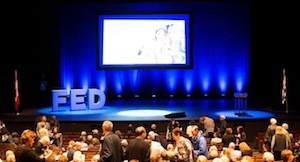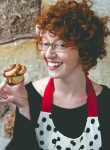Left to right are Jewish Federation of Greater Vancouver CEO Ezra Shanken, campaign chair Dr. Neil Pollock, women’s philanthropy chair Lisa Pullan, board chair Stephen Gaerber and major donors co-chairs Alex Cristall and Andrew Merkur. (photo from JFGV)
On Sept. 17, Jewish Federation of Greater Vancouver kicked off this year’s annual campaign with a new event: FEDtalks. Featuring brief TED-style talks from four speakers – the Hon. Irwin Cotler, Eli Winkelman, Dafna Lifshitz and Rabbi David Wolpe – more than 700 community members attended the event at the Queen Elizabeth Theatre.

“Each speaker delivered a message that was Federation related, from the refugee and migrant crisis, to caring for those facing hunger, to leveling the playing field in Israel’s periphery, to inspiring people to connect more fully with their Jewish identity and values,” said Jewish Federation chief executive officer Ezra S. Shanken. “Their messages were our messages, and they reflected the soul of who we are as a Federation.”
Cotler addressed issues important to the Vancouver Jewish community – and, indeed, to the world – with particular emphasis on Syria and the refugee and migrant crisis. As a well-respected parliamentarian and human rights lawyer, he brought depth and breadth of knowledge on the crisis.
Winkelman shared her story of turning the simple act of baking challah into acts of social justice by founding Challah for Hunger, which now has 90 chapters on college campuses in three countries. Her work was recognized by President Bill Clinton, who highlighted Challah for Hunger in his book Giving: How Each of Us Can Change the World.
Lifshitz, CEO of Appleseeds Academy, addressed her organization’s work bridging the digital divide in Israel’s periphery and, in particular, the Net@ program that is supported by Jewish Federation. Through Net@, at-risk youth in our partnership region of the Upper Galilee receive specialized computer training that catapults them into highly-skilled, well-paying jobs, thus helping break the cycle of poverty.
Wolpe, who was named the most influential rabbi in America by Newsweek magazine, also addressed the refugee and migrant crisis, but from a Jewish perspective. He closed the evening with an inspirational message that united the community through the shared values of chesed, tzedaka and tikkun olam.
The Vancouver Jewish community’s central fundraising initiative, the annual campaign supports critical social services, Jewish education, seniors programs and young adults programs, and fosters ties with our partnership region in Israel. To donate or volunteer, visit jewishvancouver.com/what-to-give/annual-campaign.


